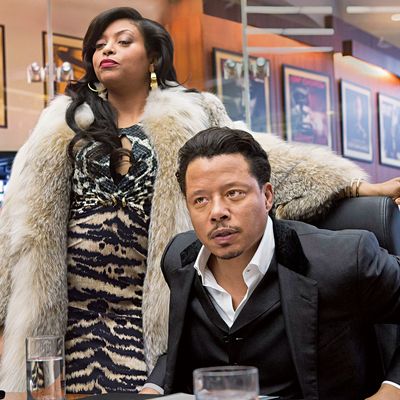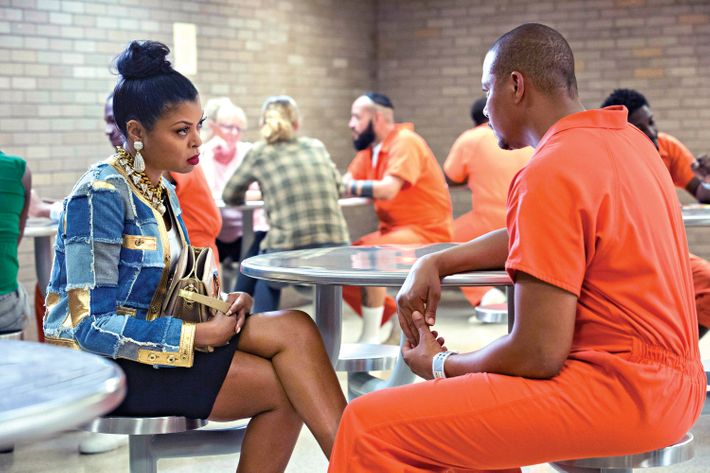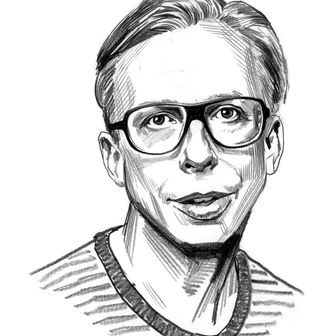
Lee Daniels slouches down into one of the beige sofas in the lobby bar of the Beverly Hilton, warily eyeing the young man arriving for his shift behind the piano — “He better not! Or we gonna have to move” — and waiting for the margarita he is drinking to kick in. Daniels seems to be in several performative moods at once — ebullience, righteous dudgeon, and confessional intimacy — while keeping an eye on how his listener responds to each. But there is a lot distracting him these days.
He is here on this August afternoon after promoting the triumphal second season of the soapy pop juggernaut he co-created, Empire, before the members of the Television Critics Association, who had assembled, MacBooks open, in the hotel ballroom, to be fed the fall season by the Fox publicity team. Daniels was on a panel with Empire’s showrunner, Ilene Chaiken, best known for creating The L Word; Empire’s producer, Brian Grazer; and Taraji P. Henson, the actress who, by playing the indomitable ex-con ex-wife Cookie Lyon, has become one of the most famous women in America and was recently nominated for an Emmy.
The TCA event is more ritualistic than journalistic, as reporters stand and wait to be handed the mike to recite their questions. One reporter had asked, with exquisite codedness, why it was that “general-market audiences” might be so interested in this type of show. “Do you see a little bit of Suge [Knight] in Cookie?” he’d wanted to know. Daniels had responded archly: “There’s a lot of sugar in Cookie!”
But mostly, during both the panel and our time together, Daniels kept going back to his sense of mission, of pushing boundaries, of showing things outside of the experience of “general-market audiences”: “When I’m afraid — Oh my God, are we really going to do this? — then I know I’m in a safe place,” he says. “We want to continue to tell tough truths.”
The panelists promised more bling, backstabbing, and celebrity cameos this season, too, with the gangsta rapper turned business titan patriarch (and Cookie’s ex) Lucious Lyon in prison for murder, and his gay son, Jamal, turning himself into, as Daniels puts it to me later, Michael Corleone.
“When I saw what they were doing” with the new season, Henson said from the stage, “I said, ‘You’re taking apart the machinery of the show.’ ” She looked at Chaiken. “And Ilene said …”
“I’m not going to say those words,” Chaiken demurred.
So Daniels did, with cackling defiance: “We’re going to fuck shit up!”
Empire first aired in January 2015, and its blitzkrieg conquest of the Zeitgeist was immediate. It seemed to confirm that, with the right show — Daniels framed it as a “black Dynasty” while his co-creator, Danny Strong, conceived of it as a “hip-hop Lion in Winter” — network TV could still do something like what it used to do, when Aaron Spelling and Norman Lear ruled the airwaves. Abetted by social media and late-to-the-party streaming, it was the first show in decades to have its Nielsen ratings go up five weeks in a row; the finale attracted 17 million viewers (and generated hundreds of thousands of tweets). This past spring, Empire even goosed the music business it fictionally portrays (it’s really set in something more like the ’90s music business, Chaiken admits to me later) when its soundtrack debuted at the top of “The Billboard 200” and songs like “Drip Drop” and “Good Enough” each earned north of 10 million streams. (Chaiken says a streaming story line will be added this season to try to make the music-business side of the show feel more up-to-date.)
The trick is how to keep it popping — for 18 episodes, up from the first season’s dozen, each packed with lunatic plot twists. To help inspire him, Daniels, 55, has been rewatching Dynasty with his boyfriend, who’s 33 and had never seen it before. “Dynasty is a motherfucking beast,” he declares at the bar, where the boyfriend, who has a fantastic, blown-out pompadour, is sitting nearby. “It’s fierce. It’s beyond. I’m watching it and thinking, Oh my God, we’re not as good as Dynasty. It upped my game.”
Henson had swung by the lobby bar earlier, wearing Alaïa studded black stilettos and elaborate Cookie nails that coordinated well with her tasteful, un-Cookie-like green Cushnie et Ochs dress. She knew the show was a hit by the second episode. “Because I’m an avid social-media user,” she says, ordering a vodka–and–grapefruit juice. “I saw that the word is spreading. And when I started seeing more faces like yours” — she waved her manicure at me, and I’m without a doubt quite white — “on my timeline, I knew we’d crossed over.”
Part of the thrill of the show for those involved is that it redefined the concept of what a term like general-market audiences means. Celebrity skirmishes over representation and identity between the likes of Nicki Minaj, Kanye West, and Taylor Swift aside, pop music has moved far more quickly than film and television toward understanding this shift; for those under 30, no matter what race they are, hip-hop has always been the power center of pop culture.
Empire’s success helped incentivize Hollywood to — for bottom-line reasons, if nothing else — abruptly switch casting priorities, opening up many more roles to nonwhite actors. In June, Daniels declared, during The Hollywood Reporter’s “Drama Showrunner Roundtable,” “Black people hate white people writing for black people. It’s so offensive,” which set off alarm bells in a reliably liberal industry that continued to see itself as something of a meritocracy even as it continued to be overwhelmingly undiverse.
“People thought I was racist for what I said,” Daniels tells me. “And I was like, ‘My boyfriend is white. My ex-boyfriend is white. I have a white showrunner, a white writing partner.’ ”
That morning, Fox had announced it’d picked up the pilot for his second show, Star, about a girl group trying to make it in Atlanta. And casting was about to be announced for a project Strong was co-writing with him: his long-gestating Richard Pryor biopic (Mike Epps plays the lead; Oprah is his grandmother, Eddie Murphy his dad). But more recently, he’d been playing around in a short video on Instagram (@theoriginalbigdaddy) with one of the stars of Empire, Jussie Smollett, who plays the gay son, Jamal, and he’d jokingly reacted to the Emmys’ snubbing the show for Best Drama by saying of the voters: “Fuck these motherfuckers.”
“You know,” he says, as the piano player noodles out a rendition of Pharrell’s “Happy,” “I’m always in trouble for telling the truth.”
Daniels grew up watching Spelling’s and Lear’s shows, which are “etched in my brain. Imprinted in my brain,” he says. “I am a product of that. And so I don’t like television now.” He has his eyes on becoming a curious hybrid of Spelling, a Jew from the South who grew up poor and turned himself into a mind-candy tycoon richer than the Carringtons, and Lear, the social-consciousness entertainment powerhouse.
“Look, my life is what my life is. It’s an open book,” he says. Everything Daniels does comes out of that book — yes, even Precious was, he says, in certain ways, about him. He tells me Star was inspired by what he had to do to succeed in showbiz. (It’s based on Lear’s Good Times, which was set in a housing project.) When I ask if he’s ever worried that he’ll run out of source material, he laughs. “I can just draw on a year of my life and we got five years right there.”
He’d arrived in Los Angeles as a college dropout and the son of a police officer. Daniels’s father once put him in the garbage can after seeing him wearing his mother’s pumps — as Lucious did to Jamal on Empire. He wanted to be a screenwriter but ended up running his own hospice-care agency. Eventually, he sold that and started managing actors, which led to his producing films.
He started out making what he calls “niche films.” Then Precious made him famous and friends with Oprah.
Things were going well, but Daniels says two things happened. One day, comedienne Whitney Cummings came over to his house and, when he opened an envelope with a massive paycheck, she told him, “Lee, you have to do television,” since, as the star of a sitcom, Whitney, and co-creator of 2 Broke Girls, she got a check like that every week.

But the real change came with working on 2013’s The Butler with Strong, who had gone from acting on Buffy the Vampire Slayer to co-writing the final two Hunger Games movies. “We really became close in postproduction on The Butler,” Strong tells me when we meet up at the Soho House in New York. Customarily, writers aren’t involved in how the film is edited, but Daniels liked Strong’s input. “I would give him notes on cut after cut after cut, and he would use them,” Strong recalls.
And then one day Strong was driving through L.A.’s Chinatown, intrigued by a story on the radio about hip-hop mogul Sean “Puffy” Combs. He wondered what sort of film he could write set in Puffy’s world. Not that he knew much about hip-hop. “I try to go to mythological or Shakespearean archetypes.” So Strong thought: Maybe I could do a hip-hop King Lear. “Then literally the whole thing flooded into my head in 60 seconds. And I thought, I should pitch this to Lee.”
But before Strong did that, he massaged the idea a bit. “I really hit that the middle son who’s gay is the one who should inherit the empire, but his father is so homophobic he hates him for it,” he says. “I knew that was Lee’s relationship with his father. I purposely put stuff in that I knew was personal to him in that original pitch.” It worked.
Daniels called back the next day and said he thought it should be a TV show, and they ended up talking about Dallas and, naturally, Daniels’s beloved Dynasty. “Lee and I like working with each other because we like things that are dramatic and funny at the same time and also that have depth,” says Strong.
Brian Grazer calls Daniels and Strong an “odd couple.” “You should have been with us when we pitched the show to all four networks,” he says. “Lee would start off — I think maybe he was wearing pajamas, as he likes to — and spurt out some kind of brilliance and then he’d say, ‘Danny, finish,’ and then Danny would have to kind of invent what was behind that fragment of a sentence.”
“The two of us together,” says Daniels about his working relationship with Strong, “it’s like having sex with a straight man without the sex. He’s helped me understand story and commercialness.”
For his part, Strong says, “I’m constantly being asked, ‘How does a white writer write an African-American show?’ I always say the same thing: I don’t write about myself.” He wrote the HBO adaptations of Game Change and Recount, but “I have no background in politics. If I want to write about myself, it would all be about an actor annoyed that he didn’t get the audition.”
One result of the partnership of these two seemingly disparate personalities’ creating their first TV series is a show that’s unusually trusting of its talent. Henson is known for her ad libs, which have now become iconic (see “Boo Boo Kitty”). “I’m telling you, you do not get to do that on television,” Henson says. “You cannot go off that script.” But Empire believes in her, in her ability to channel Cookie. Sometimes, the cameras roll, and “I literally don’t know what I’m going to say. I have no control over Cookie. Once I have on that hair and makeup, she takes over.”
When I arrive at the Empire HQ, in a rather generic and underpopulated-feeling Fox office building in Beverly Hills, Daniels is one of the first people I run into. He is barefoot, in sweatpants, and in the middle of editing the season premiere, which he directed and which will air September 23.
I ask him what I should ask Chaiken, with whom I have an appointment. “Ask her why,” at the TCA panel, “she pussied out on saying that she was going to fuck things up this season,” he says. Then he ducks back into the editing room.
“This was the original MySpace office,” says Chaiken, who is wearing denim culottes, when she shows me in. “So we’re like living in the bones of one of the corporation’s biggest failures.”
And so, once Chaiken, who worked under Aaron Spelling for five years, and I settle down in her office, she in a brown leather beanbag chair, I ask her Daniels’s question. “It’s a total performance,” she answers. “As we were walking onto the stage, Taraji told me she was going to say that, and I thought, When I’m sitting there with Lee and Taraji, I should just play like I’m the conservative white lady who never says fuck.” Which, she assures me, she does, and often.
I ask her about Daniels’s obsession with the idea of something being “true,” and the idea that he is always “in trouble.” “That’s an important starting point for Lee,” Chaiken says. “That my truth exposes something that other people don’t expose.” As for being “in trouble,” “I think that his world would not be any good if he didn’t have that feeling. Lee doesn’t want the world to change to where he can do whatever he wants. It’s important for him to feel like he’s defying someone.”
I tell Chaiken that Daniels thought Dynasty might be better than Empire, and she shrugs. She wasn’t convinced when Daniels said that to her, too. “I told Lee, ‘You’re doing yourself a disservice, because this show owes a huge debt to those shows, but it’s also so much better and about so much more.’ You know, those shows were great fantasies. They were fantasies for white people, I mean loads of folks who aren’t white, you know — everybody watched them, watched them in the way that gay people watched old movies and we transpose and we just put ourselves into those stories and make them our own, and that’s what we all did for years and years because we had nothing of our own.” Empire is a soap that people who aren’t black, or aren’t gay, still get lost in, which might be progress.
The writers’ room, adjacent to Chaiken’s office, is staffed by a diverse and cheerful group, and I hear singing and giggling while she and I talk. The walls are covered with colored papers and Post-it notes, with reminders of plot beats and the current motivations of various characters, and a whiteboard reminding the writers of Lucious’s many past misdeeds. There’s also a complicated poster titled “The Grand Taxonomy of Rap Names.” On the sofa, there’s a pillow emblazoned with LEVITICUS, the unsubtle name of the show’s nightclub.
There are 12 writers employed by Empire this season, a significant increase over the number it had last season. This is in order to maintain the pace of a show densely plotted with OMG moments, but it also comes out of Daniels’s desire to keep things feeling authentic and give people a chance to prove their talents. So they hired some less experienced writers from the world in which the show is set. It’s little things like last season’s inclusion of very of-the-moment slang like THOT (“that ho over there”) that keep the show feeling engaged.
“They have all of that language,” says Chaiken. “When THOT got into a script, I didn’t even know what it meant.”
Increasingly, and for good reason, Empire can’t be just the Daniels-and-Strong show anymore. (Strong is not involved in Star.)
Part of the idea of Empire is to plug into fantasies of the American Dream, and those dreams tend not to be humble. “One of Lee’s ideas,” says Grazer, “was that black people will be excited to see a show about black people who aren’t in poverty the entire time.” This is the mythic power of hip-hop: as an on-ramp to affluence. As Grazer puts it, the Lyons’ rise “makes you feel like you can do anything.” As Lucious noted, in a monologue Strong wrote for the end of the first season’s second episode, the role of the rapper in society is akin to that of the folk hero. The music business is captivating because, as a generator of class aspiration, its promised success is seemingly attainable. “We’ve seen a drug dealer become a rap superstar who has access to the president,” says Grazer. This culturally familiar narrative, this Jay-Z-Alger-esque tale, is probably why the show has been targeted by people claiming that their narratives were co-opted by Empire, like a Detroit woman named Sophia Eggleston, who has filed suit against Daniels and Fox, seeking $300 million in damages on the grounds that she’s the “real” Cookie.
And yet the ever-restless Daniels has lately started to worry that the world of Empire can be too uniformly luxe — and not just because the record labels aren’t Jacuzzis full of cash these days. “It’s not just about the glamour,” he says sharply.
At the Beverly Hilton, he returns to that general-market-audiences question. When I ask him if he thinks the assembled entertainment bloggers had understood what he meant when he talked about Empire’s goal of “simply telling the truth” — about what people want, and the lengths to which they’ll go to get it — for the first time he deflates a bit. “Isn’t that sad?” he says. “They don’t know what the fuck I am talking about.”
*This article appears in the September 7, 2015 issue of New York Magazine.


